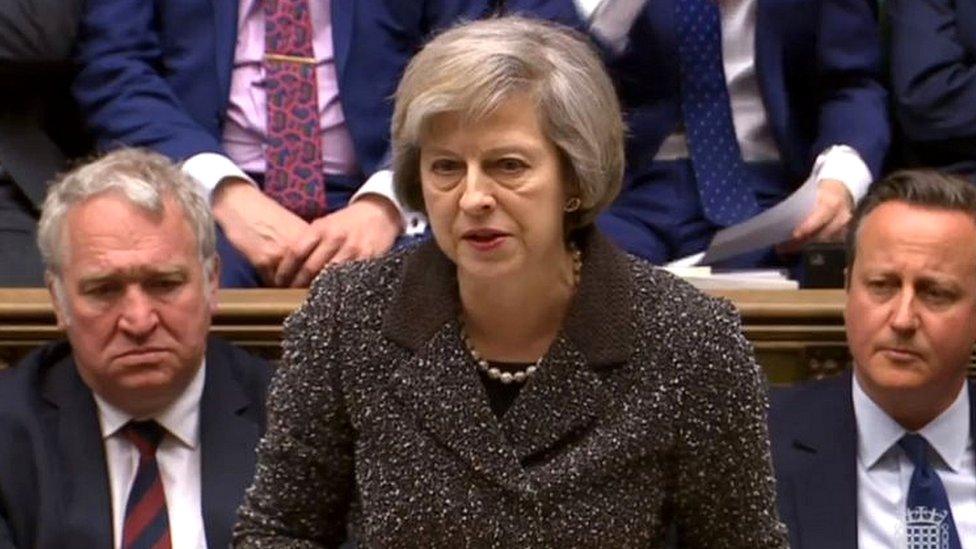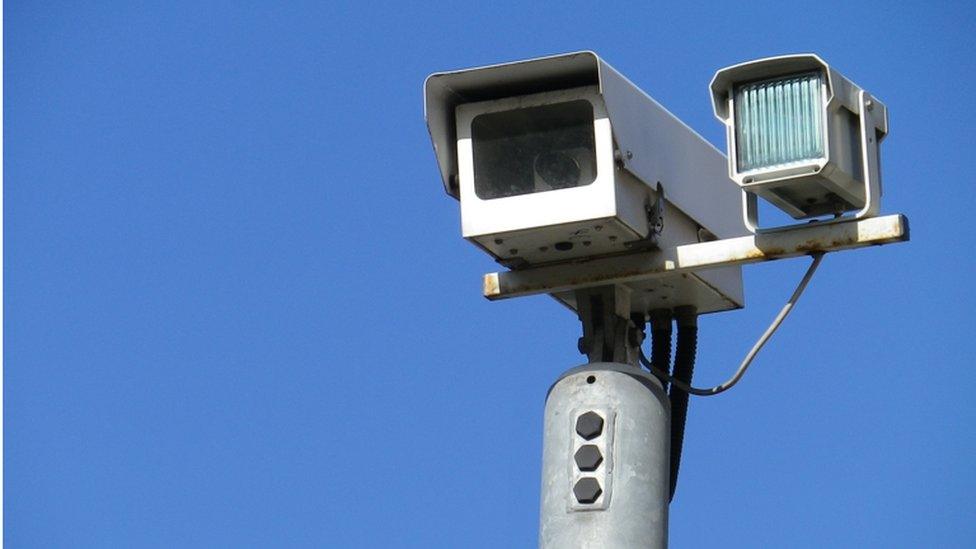Spy bill faces Commons dissection
- Published

Is it a revamped "Snoopers Charter," or is it an essential set of 21st century powers, to fight organised crime and terrorism?
Should the government be able to access your internet browsing history, bug your computer or smartphone, access and hold data on your medical history, trade union activities and much, much more?
If so, what protections and procedures should be in place to control the process? How far should judges ride shotgun as ministers authorise intrusive powers? Should there be a watchdog to protect the citizen?
These are some of the issues to be fought out next week, when the Commons holds two days of detailed debate on the Investigatory Powers Bill (here is my regular rundown of what is coming up in Parliament next week).
This is the latest bill aimed at giving the security services and the police up-to-date powers to monitor activity on the internet - it comes with a long back-story: first there was the Communications Data Bill (the original Bill dubbed the Snoopers Charter, by its opponents) which was dropped after being savaged by a committee of MPs and Peers; then there was DRIPA, the Data Retention and Investigatory Powers Act (DRIPA), which only made it through Parliament after a clause was added to make it expire at the end of December. Now the IP Bill aims to renew and update those powers.
The key to understanding what is going on, as this legislation returns to the Commons for two days of detailed Report Stage debate, next week, is the Parliamentary timetable and the mathematics in both the Commons and the Lords.
The Bill has to be passed before the DRIPA expires in December - otherwise the legal authority for the existing powers will lapse (although there's always the option, in extremis, of passing an emergency mini-bill to continue the existing powers for a couple of months).
Government concessions
Then there's the maths - faced with some formidable backbench Tory critics, the government cannot rely on its narrow Commons majority, and needs at least the acquiescence of Labour to get the Bill through the House - and it has no majority at all in the Lords, so a roughing-up in the Commons may mean peers think they then have a licence to fillet the Bill of its most controversial provisions.
And there's plenty of scope for controversy. The ur-text on this are the speeches by Shadow Home Secretary Andy Burnham and Labour's frontbench superlawyer, Sir Keir Starmer, at the Second Reading debate in March (the bill has been "carried over" from the previous session), where they set out their key concerns.

Then, Labour abstained - arguing that a new framework for investigatory powers was needed, but this wasn't it.
They set out a shopping list of changes required to gain their support. And since then an intensive process of behind the scenes negotiation has been under way - both between Labour and the government and with dissident Tories and amongst the opposition parties (providing, whisper it quietly, a rare example of Labour-SNP cooperation).
This week, that process produced a couple of major government concessions.
Trade unions
First the Independent Reviewer of Terrorism Legislation, David Anderson QC, has been commissioned to examine the operational case for the powers in the Bill (Labour being unconvinced by the evidence produced by the government, thus far).
He will report back before the Bill reaches its Committee Stage in the House of Lords, and the government will have a hard time resisting any recommendations he makes, and would probably face defeat in the Upper House, if it did.
Second, the government has agreed to accept Labour amendments making it clear that the powers in the Bill cannot be directed against legally-constituted trades unions.

In addition, Home Secretary Theresa May has put down a new "privacy clause" (NC5) giving the various authorities allowed to employ the investigatory powers a duty to "have regard to: (a) whether what is sought to be achieved by the warrant, authorisation or notice could reasonably be achieved by other less intrusive means, (b) the public interest in the integrity and security of telecommunication systems and postal services, and (c) any other aspects of the public interest in the protection of privacy".
This gives critics of the Bill some of the safeguards they want.
Another government amendment will add a requirement for "exceptional and compelling circumstances" to justify the retention and examination, of health records. There is also movement on providing special protection for MPs, lawyers and journalists.
Plenty of issues remain, however.
'Judicial review'
All the opposition parties remain concerned about the extent to which the Bill would require people's internet connection records (ICRs) to be kept for 12 months.
This would reveal which websites had been visited by who - although not the detail of what had been looked at within a particular site. There is still considerable dispute over the threshold of seriousness which should be crossed before this information could be accessed.
Then there's the question of how authorisation should be granted. In the Bill, the security services apply to the Secretary of State for a warrant and then a Judicial Commissioner reviews the minister's decision under 'judicial review principles' - effectively checking that a proper process has been followed, rather than considering the merits of the application.

Both Labour and former Shadow Home Secretary David Davis, a long-standing critic of the government's approach on investigatory powers and an important player on the Tory benches, have amendments down to tighten up this "double-lock" scrutiny mechanism and remove reference to judicial review principles throughout the Bill.
Both want to give the Judicial Commissioner the same power as the Secretary of State to determine whether a warrant is required based on the evidence available.
Major flashpoints
And David Davis goes further, with a new clause (NC 22) to reverse the approval process, so that an application for a warrant is first made to a Judicial Commissioner, rather than the Secretary of State - although Labour look unlikely to support that.
This area could be one of the major flashpoints; the government will probably resist any further erosion of ministers' role, on the principle that ministers, not judges, should take such decisions - and be accountable to Parliament for them.
The SNP want even more controls - they're particularly concerned about equipment interference, one of the most intrusive powers in the bill, which would allow the direct bugging of computers, smartphones and other devices - and where it's applied to Parliamentarians, which includes those in the Scottish Parliament, the Northern Ireland Assembly and the Welsh Assembly, they want both the Secretary of State and the Prime Minister to sign off on equipment interference warrants.
They are also calling for heavier supervision of the use of investigatory powers - with amendments to replace the proposed Investigatory Powers Commissioner with a bigger, all-singing, all-dancing Investigatory Powers Commission.
And across the opposition parties there is a move to ensure that the appointment of the Commissioner (or, if agreed, the members of the SNP's Commission) can be made, except on the recommendation of independent judicial appointments bodies in England and Wales, Scotland and Northern Ireland.
'Unlawful use'
Meanwhile, UKIP's Douglas Carswell has an amendment to require the appointment of the Investigatory Powers Commissioner to be agreed by the Intelligence and Security Committee of Parliament.

Lib Dem former Scottish Secretary Alistair Carmichael has an amendment to address the problem that, because of the nature of the business, people who are wrongly subject to intrusive surveillance are unable to secure redress.
To deal with this he proposes giving the Investigatory Powers Commissioner the power to notify those who have been a subject to an interception warrant/equipment interference/covert human intelligence gathering etc, when the authorisation or warrant against them has fallen.
This would allow someone who is notified of their surveillance to take a case before the investigatory powers tribunal and would discourage the police or security services from mounting fishing expeditions based on very little evidence. A similar system is already in place in Germany, Belgium and California. This probably goes too far for Labour.
The political parties are not the only players. The Intelligence and Security Committee, the high-powered parliamentary watchdog, chaired by the former Attorney General, Dominic Grieve, has weighed in with amendments designed to put privacy at the heart of the Bill.
They start with New Clause 4, which creates a criminal offence of "unlawful use of investigatory powers".
'Operational purposes'
It's not a completely new offence, but the idea is to create a catch-all crime, taking in what the committee calls the "intrusive investigatory powers in the Bill," rather than relying on offences scattered across several pieces of legislation.
Another amendment (25) aims to limit the potentially broad scope of thematic warrants involving people who "share a common purpose" by ensuring that they also must be engaged in a particular activity.
Then there's New Clause 2, to allow the ISC to refer matters on behalf of Parliament, to the Commissioner and to provide a mechanism for the Committee to be informed of the outcome. And there's a proposal that the list of "Operational Purposes" for which the powers can be used is reviewed at least annually by the Prime Minister.
Other amendments have come from individual MPs: the Conservative Stephen McPartland's New Clause 6 is designed to limit access to Communications Data to the Intelligence Services and Law Enforcement Agencies only.
"There is no rationale for organisations such as Food Standards Agency and Gambling Commission to have the same incredibly intrusive powers as the Intelligence Services, Mr McPartland said.
Conservative ex-minister Sir Edward Leigh wants to require the Secretary of State to consult the Speaker before deciding to issue a warrant that applied to an MP's communications - and a further cross-party amendment extends that to the presiding officers of all UK legislatures.
SNP concerns
And the SNP go further - proposing a new clause (NC23) to ensure applications for a targeted equipment interference warrant or targeted examination warrant against Parliamentarians are decided by a Judicial Commissioner, without the involvement of the Home Secretary - and it would also provide extra safeguards to the correspondence of Parliamentarians when a warrant for hacking is sought.
This is just a cross-section of some 400 amendments.
Of course, many will not be selected by the Speaker for debate, while others will be grouped together, but there will be plenty of issues on which the government, faced with a combination of most of the Opposition parties, plus an array of Tory dissidents, may be forced into concessions.
There's a delicate political dance here, because while ministers are not in a strong position, Labour (which would be the essential keystone of any government defeat) cannot afford to be painted into a corner where it looks soft on terrorism.
While almost the entire Opposition abstained at Second Reading, few are expected to do so when Third Reading is reached on Tuesday.
But it would take a monumental bust-up over some really crucial point for Labour to vote against - especially when they know that the Bill will certainly be highly vulnerable to further amendment, when it reaches the House of Lords.
The SNP, meanwhile, say the government has not responded to their concern.
Justice spokesperson Joanna Cherry MP said: "For the UK government to dismiss reasonable SNP amendments outright means they run the real risk of putting opposition parties in the position of having to vote against the Bill in its entirety.
"That is not a decision that we would take lightly - so I call on the Home Secretary to urgently reconsider adopting our proposals before next week's vote."
- Published2 June 2016
